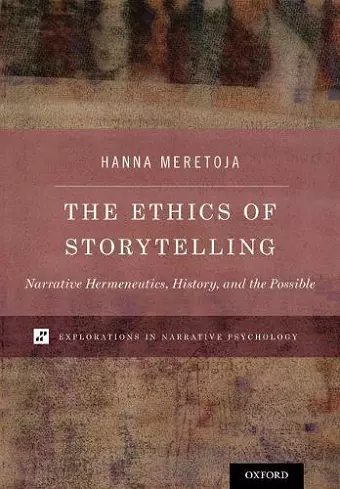The Ethics of Storytelling
Narrative Hermeneutics, History, and the Possible
Format:Hardback
Publisher:Oxford University Press Inc
Published:1st Feb '18
Currently unavailable, and unfortunately no date known when it will be back

Against the backdrop of the polarized debate on the ethical significance of storytelling, Hanna Meretoja's The Ethics of Storytelling: Narrative Hermeneutics, History, and the Possible develops a nuanced framework for exploring the ethical complexity of the roles narratives play in our lives. Focusing on how narratives enlarge and diminish the spaces of possibilities in which we act, think, and re-imagine the world together with others, this book proposes a theoretical-analytical framework for engaging with both the ethical potential and risks of storytelling. Further, it elaborates a narrative hermeneutics that treats narratives as culturally mediated practices of (re)interpreting experiences and articulates how narratives can be oppressive, empowering, or both. It also argues that the relationship between narrative unconscious and narrative imagination shapes our sense of the possible. In her book, Meretoja develops a hermeneutic narrative ethics that differentiates between six dimensions of the ethical potential of storytelling: the power of narratives to cultivate our sense of the possible; to contribute to individual and cultural self-understanding; to enable understanding other lives non-subsumptively in their singularity; to transform the narrative in-betweens that bind people together; to develop our perspective-awareness and capacity for perspective-taking; and to function as a form of ethical inquiry. This book addresses our implication in violent histories and argues that it is as dialogic storytellers, fundamentally vulnerable and dependent on one another, that we become who we are: both as individuals and communities. The Ethics of Storytelling seamlessly incorporates narrative ethics, literary narrative studies, narrative psychology, narrative philosophy, and cultural memory studies. It contributes to contemporary interdisciplinary narrative studies by developing narrative hermeneutics as a philosophically rigorous, historically sensitive, and analytically subtle approach to the ethical stakes of the debate on the narrative dimension of human existence.
Certainly one of the most interesting new literary publications in 2018. In particular, how Meretoja draws on both older theory and research results from cognitively oriented literary studies and brings them into dialogue with each other proves to be profitable. Last but not least, the book is particularly reader-friendly due to its clear structure and the numbering of its individual thoughts. * Interdisciplinary E-Journal for Narrative Research (translation) *
Erudite, measured, and nuanced, this book reminds us why we still look for and devour good stories. Narratives enrich our lives, as Hanna Meretoja argues, because they show us what is possible. Without overstating her case for the ethical value of narrative, Meretoja presents compelling evidence that literature can be an effective tool for moral and ethical reflection. Without telling us how to live our lives well and ethically, good stories give us a pretty good sense of what is good and ethical. The rest is work we must do on our own. But Meretoja does a wonderful job at offering, based on the literary examples she analyzes so brilliantly in this volume, a few valuable suggestions." * Andreea Ritivoi, Head and Professor, Department of English, Carnegie Mellon University *
Hanna Meretoja's The Ethics of Storytelling is a textured and authoritative inquiry into the interpretative webs of narrative that entangle human lives and provide the possibilities, and constraints, for the imaginative realization of self, other, and world. Breaking the disciplinary boundaries between literary studies and the human sciences, the book demonstrates the power of muscular interdisciplinary scholarship for the development of narrative theory. Meretoja masterfully argues for potential of literature to transform our understanding of history as an inevitable series of events and reinvigorate the past as a space of ethical choices and possibilities. Meretoja offers fresh insights into the collective re-interpretation of the lingering, cataclysmic, events of the 20th century but also a creative pathway forward in meeting the ethical challenges of our times. Required reading for anyone interested in narrative."
All that seems immediately present and as 'given' is the result of interpretation. This idea is at the heart of Hanna Meretoja's book in which she convincingly shows that interpretation is not only central for narrative and fiction but for the entire human condition, our being-in-the-world. Expertly bringing together rich traditions of literary scholarship, narrative theory, and hermeneutic philosophy, she sheds new light on the old riddle of how narratives help us to understand and live our lives." * Jens Brockmeier, Professor, Department of Psychology, The American University of Paris; author of Beyond the Archive: Memory, Narrative, and the Autobiographical Process *
Beautifully written and philosophically nuanced, The Ethics of Storytelling is a major contribution to the study of narrative in literature and history. Because of its rigorous but lucidly articulated interdisciplinarity, Meretoja's book will be of interest to literary theorists, philosophers, psychologists, and scholars of cultural memory, among others. At the core of this important work is the compelling ethical insight that literature can cultivate our sense of history as a sense of the possible. Focused especially on literature in the wake of the Holocaust and National Socialism, its implications are far-reaching." * Michael Rothberg, Professor, Department of Comparative Literature, University of California-Los Angeles *
Hanna Meretoja has written a much-needed book, showing how literature can expand our sense of the possible while warning against inflated claims about its moral value. Both hope and caution, she insists, are needed. Meretoja's analysis is remarkably capacious in its synthesis of literary, philosophical, and historical perspectives. Its intellectual ambitions, meanwhile, are matched by the exceptional precision and clarity of its arguments. This is essential reading for anyone interested in the ethics of narrative." * Rita Felski, William R. Kenan, Jr. Professor, Department of English, University of Virginia *
ISBN: 9780190649364
Dimensions: 155mm x 236mm x 28mm
Weight: 612g
368 pages